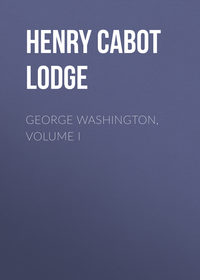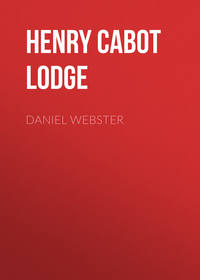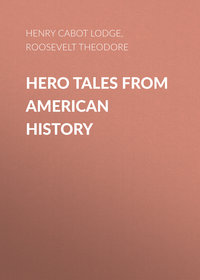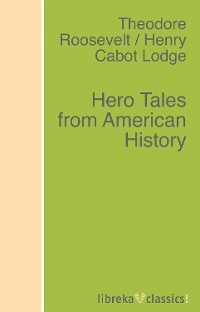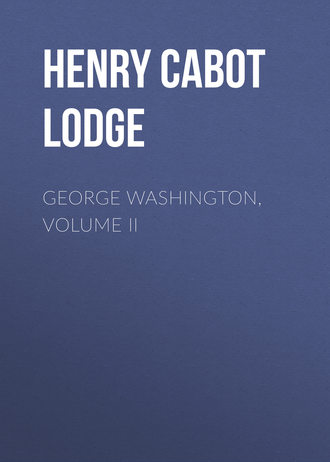 полная версия
полная версияGeorge Washington, Volume II
"I now referred to the pleasant hours I had passed in Philadelphia, and my agreeable surprise at finding there so many men of talent, at which his face lit up vividly. 'I am glad to hear you, sir, who are an Englishman, say so, because you must now perceive how ungenerous are the assertions people are always making on your side of the water. One gentleman, of high literary standing,—I allude to the Abbé Raynal,—has demanded whether America has yet produced one great poet, statesman, or philosopher. The question shows anything but observation, because it is easy to perceive the causes which have combined to render the genius of this country scientific rather than imaginative. And, in this respect, America has surely furnished her quota. Franklin, Rittenhouse, and Rush are no mean names, to which, without shame, I may append those of Jefferson and Adams, as politicians; while I am told that the works of President Edwards of Rhode Island are a text-book in polemics in many European colleges.'
"Of the replies which I made to his inquiries respecting England, he listened to none with so much interest as to those which described the character of my royal patron, the Prince of Wales. 'He holds out every promise,' remarked the general, 'of a brilliant career. He has been well educated by events, and I doubt not that, in his time, England will receive the benefit of her child's emancipation. She is at present bent double, and has to walk with crutches; but her offspring may teach her the secret of regaining strength, erectness, and independence.' In reference to my own pursuits he repeated the sentiments of Franklin. He feared the country was too poor to be a patron of the drama, and that only arts of a practical nature would for some time be esteemed. The stage he considered to be an indispensable resource for settled society, and a chief refiner; not merely interesting as a comment on the history of social happiness by its exhibition of manners, but an agent of good as a school for poetry, in holding up to honor the noblest principles. 'I am too old and too far removed,' he added, 'to seek for or require this pleasure myself, but the cause is not to droop on my account. There's my friend Mr. Jefferson has time and taste; he goes always to the play, and I'll introduce you to him,' a promise which he kept, and which proved to me the source of the greatest benefit and pleasure."
This is by far the best account of Washington in the ordinary converse of daily life that has come down to us. The narrator belonged to the race who live by amusing their fellow-beings, and are in consequence quick to notice peculiarities and highly susceptible to being bored. Bernard, after the first interest of seeing a very eminent man had worn off, would never have lingered for an hour and a half of chat and then gone away reluctantly if his host had been either dull of speech or cold and forbidding of manner. It is evident that Washington talked well, easily, and simply, ranging widely over varied topics with a sure touch, and that he drew from the ample resources of a well-stored and reflective mind. The scraps of conversation which Bernard preserves are interesting and above the average of ordinary talk, without manifesting any attempt to be either brilliant or striking, and it is also apparent that Washington had the art of putting his guest entirely at his ease by his own pleasant and friendly manner. He had picked up the English actor on the road, liked his readiness to be helpful (always an attraction to him in any one), found him well-mannered and intelligent, and brought him home to rest and chat in the pleasant summer afternoon. To Bernard he was simply the plain Virginia gentleman, with a liberal and cultivated interest in men and things, and not a trace of oppressive and conscious greatness about him. It is to be suspected that he was by no means equally genial to the herd of sight-seers who pursued him in his retirement, but in this meeting he appeared as he must always have appeared to his family and friends.
We get the same idea from the scattered allusions that we have to Washington in private life. Although silent and reserved as to himself, he was by no means averse to society, and in his own house all his guests, both great and small, felt at their ease with him, although with no temptation to be familiar. We know from more than one account that the dinners at the presidential house, as well as at Mount Vernon, were always agreeable. It was his wont to sit at table after the cloth was removed sipping a glass of wine and eating nuts, of which he was very fond, while he listened to the conversation and caused it to flow easily, not so much by what he said as by the kindly smile and ready sympathy which made all feel at home. We can gather an idea also of the charm which he had in the informal intercourse of daily life from some of his letters on trifling matters. Here is a little note written to Mrs. Stockton in acknowledgment of a pastoral poem which she had sent him:—
"MOUNT VERNON, February 18, 1784.
"Dear Madam: The intemperate weather and very great care which the post riders take of themselves prevented your letter of the 4th of last month from reaching my hands till the 10th of this. I was then in the very act of setting off on a visit to my aged mother, from whence I am just returned. These reasons I beg leave to offer as an apology for my silence until now.
"It would be a pity indeed, my dear madam, if the muses should be restrained in you; it is only to be regretted that the hero of your poetical talents is not more deserving their lays. I cannot, however, from motives of pure delicacy (because I happen to be the principal character in your Pastoral) withhold my encomiums on the performance; for I think the easy, simple, and beautiful strain with which the dialogue is supported does great justice to your genius; and will not only secure Lucinda and Amista from wits and critics, but draw from them, however unwillingly, their highest plaudits; if they can relish the praises that are given, as they must admire the manner of bestowing them.
"Mrs. Washington, equally sensible with myself of the honor you have done her, joins me in most affectionate compliments to yourself, and the young ladies and gentlemen of your family.
"With sentiments of esteem, regard and respect, I have the honor to be – –"
This is not a matter of "great pith or moment," but it shows how pleasantly he could acknowledge a civility. The turn of the sentences smacks of the formality of the time. They sound a little labored, perhaps, to modern ears, but they were graceful according to the standard of his day, and they have a gentle courtesy which can never be out of fashion.
He had the power also of paying a compliment in an impressive and really splendid manner whenever he felt it to be deserved. When Charles Thomson, who for fifteen years had been the honored secretary of the Continental Congress, wrote to announce his retirement, Washington replied: "The present age does so much justice to the unsullied reputation with which you have always conducted yourself in the execution of the duties of your office, and posterity will find your name so honorably connected with the verification of such a multitude of astonishing facts, that my single suffrage would add little to the illustration of your merits. Yet I cannot withhold any just testimonial in favor of so old, so faithful, and so able a public officer, which might tend to soothe his mind in the shades of retirement. Accept, then, this serious declaration, that your services have been important, as your patriotism was distinguished; and enjoy that best of all rewards, the consciousness of having done your duty well."
Dull men do not write in this fashion. It is one thing to pay a handsome compliment, although even that is not by itself easy, but to give it in addition the note of sincerity which alone makes it of real value demands both art and good feeling. Let us take one more example of this sort before we drop the subject. When the French officers were leaving America Washington wrote to De Chastellux to bid him farewell. "Our good friend, the Marquis of Lafayette," he said, "prepared me, long before I had the honor to see you, for those impressions of esteem which opportunities and your own benevolent mind have since improved into a deep and lasting friendship; a friendship which neither time nor distance can eradicate. I can truly say that never in my life have I parted with a man to whom my soul clave more sincerely than it did to you. My warmest wishes will attend you in your voyage across the Atlantic to the rewards of a generous prince, the arms of affectionate friends; and be assured that it will be one of my highest gratifications to keep up a regular intercourse with you by letter."
These letters exhibit not only the grace and point born of intelligence, but also the best of manners; by which I mean private manners, not those of the public man, of which there will be something to say hereafter. The attraction of Washington's society as a private gentleman lay in his good sense, breadth of knowledge, and good manners. Now the essence of good manners of the highest and most genuine kind is good feeling, which is thoughtful of others, and which is impossible to a cold, hard, or insensible nature. Such manners as we see in Washington's private letters and private life would have been strange offspring from the cold heart attributed to him by Mr. McMaster. In justice to Mr. McMaster, however, be it said, the charge is not a new one. It has been hinted at and spoken of elsewhere, and many persons have suspected that such was the case from the well-meant efforts of what may be called the cherry-tree school to elevate Washington's character by depicting him as a soulless, bloodless prig. The blundering efforts of the latter need not be noticed, but the reflections of serious critics cannot be passed by. The theory of the cold heart and the unfeeling nature seems to proceed in this wise. Washington was silent and reserved, he did not wear his heart upon his sleeve for daws to peck at, therefore he was cold; just as if mere noise and chatter had any relation to warm affections. He would take no salary from Congress, says Mr. McMaster, in fine antithesis, but he exacted his due from the family of the poor mason. This has an unpleasant sound, and suggests the man who is generous in public, and hard and grasping in private. Mr. McMaster in this sentence, however, whether intentionally or not, is not quite accurate in his facts, and conveys by his mode of statement an entirely false impression. The story to which he refers is given by Parkinson, who wrote a book about his experiences in America in 1798-1800. Parkinson had the story from one General Stone, and it was to this effect:23 A room was plastered at Mount Vernon on one occasion, and was paid for during the owner's absence. When Washington returned he examined the work and had it measured, as was his habit. It then appeared that an error had been made, and that fifteen shillings too much had been paid. Meantime the plasterer had died. His widow married again, and her second husband advertised in the newspapers that he was prepared to pay the debts of his predecessor and collect all moneys due him. Thereupon Washington put in his claim, which was paid as a matter of course. He did not extort the debt from the family of the poor mason, but collected it from the second husband of the widow, in response to a voluntary advertisement. It was very careful and even close dealing, but it was neither harsh nor unjust, and the writer who has preserved the story would be not a little surprised at the interpretation that has been put upon it, for he cited it, as he expressly says, merely to illustrate the extraordinary regularity and method to which he attributed much of Washington's success.
Parkinson, in this same connection, tells several other stories, vague in origin, and sounding like mere gossip, but still worthy of consideration. According to one of them, Washington maintained a public ferry, which was customary among the planters, and the public paid regular tolls for its use. On one occasion General Stone, the authority for the previous anecdote, crossed the ferry and offered a moidore in payment. The ferryman objected to receiving it, on the ground that it was short weight, but Stone insisted, and it was finally accepted. On being given to Washington it was weighed, and being found three half-pence short, the ferryman was ordered to collect the balance due. On another occasion a tenant could not make the exact change in paying his rent, and Washington would not accept the money until the tenant went to Alexandria and brought back the precise sum. There is, however, still another anecdote, which completes this series, and which shows a different application of the same rule. Washington, in traveling, was in the habit of paying at inns the same for his servants as for himself. An innkeeper once charged him three shillings and ninepence for himself, and three shillings for his servant. Thereupon Washington sent for his host, said that his servant ate as much as he, and insisted on paying the additional ninepence.
This extreme exactness in money matters, down even to the most trifling sums, was no doubt a foible, but it is well to observe that it was not a foible which sought only a selfish advantage, for the rule which he applied to others he applied also to himself. He meant to have his due, no matter how trivial, and he meant also that others should have theirs. In trifles, as in greater things, he was scrupulously just, and although he was always generous and ready to give, he insisted rigidly on what was justly his. A gift was one thing, a business transaction was another. The man himself who told these very stories was a good example of the kindliness which went hand in hand with this exactness in business affairs. Parkinson was an Englishman, of great narrowness of mind, who came out here to be a farmer, failed, and went home to write a book in denunciation of the country. America never had a more hostile critic. According to this profound observer, there was no good land in America, and no possibility of successful agriculture. The horses were bad, the cattle were bad, and sheep-raising was impossible. There was no game, the fish and oysters were poor and watery, and no one could ever hope in this wretchedly barren land for either wealth or comfort. It was a country fit only for the reception of convicts, and the cast-off mistress of an Englishman made a good wife for an American. A person who held such views as these was not likely to be biased in favor of anything American, and his evidence as to Washington may be safely trusted as not likely to be unduly favorable. He tells us that on his arrival at Mount Vernon, with letters of introduction, he was kindly received; that this hospitality was never relaxed; and that the general lent him money. He was at least grateful, and these are his last words as to Washington:—
"To me he appeared a mild, friendly man, in company rather reserved, in private speaking with candor. His behavior to me was such that I shall ever revere his name.
"General Washington lived a great man, and died the same.
"I am of opinion that the general never knowingly did anything wrong, but did to all men as he would they should do to him."
Evidently he appeared to Mr. Parkinson kindly and generous, as well as exactly just. It is well to have the truth about Washington, and nothing but the truth. Yet in escaping from the falsehoods of the eulogist and the myth-maker, let us beware of those which spring from the reaction against the current and accepted views. I have quoted the Parkinson stories at length, because they enforce this point admirably. No a priori theory is safe, and to assume that Washington must have committed grave errors and been guilty of mean actions because they are common to humanity, and have not been admitted in his case, is just as misleading as to assume, as is usually done, that he was absolutely perfect and without fault.
Let it be admitted that Washington, ever ready to pay his own dues, was strict, and sometimes severe, in demanding them of others; but let it be also remembered, this is the worst that can be said. He was always ready to overlook faults of omission or commission; he would pardon easily mismanagement or extravagance on his estate or in his household; but he had no mercy for anything that savored of ingratitude, treachery, or dishonesty, and he carried this same feeling into public as well as private affairs. No officer who had bravely done his best had anything to fear in defeat from Washington's anger. He was never unjust, and he was always kind to misfortune or mistake, but to the coward or the traitor he was entirely unforgiving. This it was which made Arnold's treason so bitter to him. Not only had he been deceived, but the country as well as himself had been most basely betrayed; and for this reason he was relentless to André, whom it is said he never saw, living or dead. The young Englishman had taken part in a wretched piece of treachery, and for the sake of the country, and as a warning to traitors, Washington would not spare him. He would never have ordered a political prisoner to be taken out and shot in a ditch, after the fashion of Napoleon; nor would he have dealt with any people as the Duke of Cumberland dealt with the clansmen after Culloden. Such performances would have seemed to him wanton as well as cruel, and he was too wise and too humane a man to be either. Indian atrocities, for instance, with which he was familiar, never led him to retaliate in kind. But he was perfectly prepared to exact the extremest penalty by just and recognized methods; and had it not been for the urgent entreaties of his friends, he would have sent Asgill to the scaffold, repugnant as it was to his feelings, because he felt that the murder of Huddy was a crime for which the English army was responsible, and which demanded a just and striking vengeance. He was, it may be freely confessed, of anything but a tame nature. There was a good deal of Berserker in his make-up, and he was fierce in his anger when he believed that a great wrong had been done. But because he was stern and unrelenting when he felt that justice and his duty required him to be so, no more proves that he had a cold heart than does the fact that he was silent, dignified, and reserved. Cold-blooded men are not fierce in seeking to redress the wrongs of others, nor are the fluent of speech the only kind and generous members of the human family.
Washington's whole life, indeed, contradicts the charge that he was cold of heart and sluggish of feeling. The man who wrote as he did in his extreme youth, when Indians were harrying the frontier where he commanded, was not lacking in humanity or sympathy; and such as he then was he remained to the end of his life. A soldier by instinct and experience, he never grew indifferent to the miseries of war. Human suffering always appealed to him and moved him deeply, and when it was wantonly inflicted stirred him to anger and to the desire for the wild justice of revenge.
The goodness and kindness of man's heart, however, are much more truly shown in the little details of life than in the great matters which affect classes or communities. Washington was considerate and helpful to all men, and if he was ever cold and distant in his manner, it was to the great, and not to the poor or humble. As has been indicated by his recognition of the actor Bernard, he had in high degree the royal gift of remembering names and faces. When he was at Senator Dalton's house in Newburyport, on his New England tour of 1789, he met an old servant whom he had not seen since the French war, thirty years before. He knew the man at once, spoke to him, and welcomed him. So it was with the old soldiers of the Revolution, who were always sure of a welcome, and, if he had ever seen them, of a recognition. No man ever turned from his presence wounded by a cold forgetfulness. When he was at Ipswich, on this same journey, Mr. Cleaveland, the minister of the town, was presented to him. As he approached, hat in hand, Washington said, "Put on your hat, parson, and I will shake hands with you." "I cannot wear my hat in your presence, general," was the reply, "when I think of what you have done for this country." "You did as much as I." "No, no," protested the parson. "Yes," said Washington, "you did what you could, and I've done no more." What a gracious, kindly courtesy is this, and not without the salt of wit! Does it not show the perfection of good manners which deals with all men for what they are, and is full of a warm sympathy born of a good heart? He was criticised for coldness and accused of monarchical leanings, because, at Mrs. Washington's receptions and his own public levees, he stood, dressed in black velvet, with one hand on the hilt of his sword and the other behind his back, and shook hands with no one, although he talked with all. He did this because he thought it became the President of the United States upon state occasions, and his sense of the dignity of his office was always paramount. But away from forms and ceremonies, with the old servant or the old soldier, or the country parson, his hand was never behind his back, and his manners were those of a great but simple gentleman, and came straight from a kind heart, full of sympathy and good feeling.
He was, too, the most hospitable of men in the best sense, and his house was always open to all who came. When he was away during the war or the presidency, his instructions to his agents were to keep up the hospitality of Mount Vernon, just as if he had been there himself; and he was especially careful in directing that, if there were general distress, poor persons of the neighborhood should have help from his kitchen or his granaries.
His own more immediate hospitality was of the same kind. He always entertained in the most liberal manner, both as general and President, and in a style which he thought befitted the station he occupied. But apart from all this, his table, whether at home or abroad, was never without its guest. "Dine with us," he wrote to Lear on July 31, 1797, "or we shall do what we have not done for twenty years, dine alone." The real hospitality which opens the door and spreads the board for the friend or stranger, admitting them to the family without form or ceremony, was his also. "My manner of living is plain," he wrote to a friend after the Revolution; "I do not mean to be put out of it. A glass of wine and a bit of mutton are always ready; and such as will be content to partake of them are always welcome. Those who expect more will be disappointed, but no change will be effected by it." Genuine hospitality as unstinted as it was sincere was not characteristic of a cold man, or of one who sought to avoid his fellows. It is one of the lighter graces of life, perhaps, but when it comes freely and simply, and not as a vehicle for the display or the aggrandizement of its dispenser, it is not without a meaning to the student of character.
Washington was not much given to professions of friendship, nor was he one of the great men who keep a circle of intimates and sometimes of flatterers about them. He was extremely independent of the world and perfectly self-sufficing, but it is a mistake to suppose that because he unbosomed himself to scarcely any one, and had the loneliness of greatness and of high responsibilities, he was therefore without friends. He had as many friends as usually fall to the lot of any man; and although he laid bare his inmost heart to none, some were very close and all were very dear to him. In war and politics, as has already been said, the two men who came nearest to him were Hamilton and Knox, and his diary shows that when he was President he consulted with them nearly every day wholly apart from the regular cabinet meetings. They were the two advisers who were friends as well as secretaries, and who followed and sustained him as a matter of affection as much as politics. At home his neighbor, George Mason, although they came to differ, was a strong friend whom he liked and respected, and whose opinion, whether favorable or adverse, he always sought. His feeling to Patrick Henry was much deeper than mere political or official acquaintance, and the lovable qualities of the brilliant orator, clear even now across the gulf of a century, were evidently strongly felt by Washington. They differed about the Constitution, but Washington was eager at a later day to have Henry by his side in the cabinet, and in the last years they stood shoulder to shoulder in defense of the Union with a personal sympathy deeper than any born of a mere similarity of opinion. Henry Lee, the son of his old sweetheart, he loved with a tender and peculiar affection. He watched over him and helped him, rejoiced in the dashing gallantry which made him famous as Light-horse Harry, and, when he had won civil as well as military distinction, trusted him and counseled with him. Dr. Craik, the companion of his youth and his life-long physician, was always a dear and close friend, and the regard between the two is very pleasant to look at, as we see it glancing out here and there in the midst of state papers and official cases. For the officers of the army he had a peculiarly warm feeling, and he had among them many close friends, like Carrington of Virginia, and Charles Cotesworth Pinckney of South Carolina. His immediate staff he regarded with especial affection, and it is worthy of notice that they all not only admired their great chief, but followed him with a personal devotion which is not a little curious if Washington was cold of heart and distant of manner in the intimate association of a military family.


